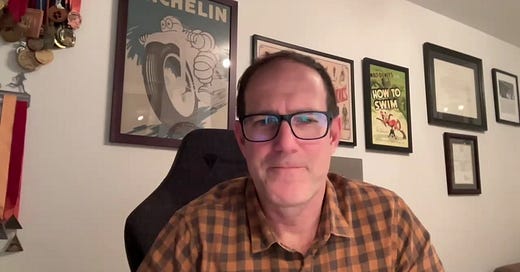We had a great discussion today with
on our general stumbling-around-in-the-dark approach to combating disinformation and influence operations by foreign adversaries. One thing Matt noted was that we had it more together — at least in terms of congressional attention and public awareness — during the Cold War than we do now, something we will be exploring in the coming weeks.A couple of things referenced in today’s discussion:
Matt’s article, The Irony of Misinformation: USIA Myths Block Enduring Solutions; and
Tim Weiner’s The Folly and the Glory: America, Russia, and Political Warfare (1945-2020)
I should note that the latter resource, which I brought up, deals with covert political warfare between the KGB and CIA, while Matt’s focus is on “public diplomacy” — and this conversation was helpful in distinguishing the two and emphasizing that both are necessary to effectively countering the problem.
I’ll be on break next week so we’ll pick up again in the New Year. When we return, I’ll be tweaking the format slightly so that we’ll have two lectures each month (basically every other week, in addition to my regular posts) and a guest speaker — I know many of you are either just joining or catching up, and this will allow me some time to join in the discussions between the lectures. I also have so many people on my list of potential guests that I need room to get them in! Speaking of which, our January speaker will be former CIA officer John Sipher, who spent 25 years in the agency, including in Russia. He has spoken to my Yale class every year and has great stories and insight into both historical and current active measures operations, so save the date! (He is already on the syllabus and I will send reminders as we get closer.)
Oh, and one more exciting thing in the New Year: I will be unveiling my new logo! It’s very cool: Stay tuned.
Finally, don’t forget that we will have our last Zoom office hours for the year this Thursday, December 22, from 12 p.m. - 1 p.m. I hope you will be able to join — we can expand the discussion to include the latest January 6 Committee referrals and findings as well, if you like.
See you soon — and if you are not able to make it Thursday, have a safe and wonderful holiday and a happy New Year!















Asha,
Thank you for hosting me. It was a lot of fun and hopefully worthwhile to those listening.
By the way, an event last month called "Reputational Security: The Imperative to Reinvest in America’s Strategic Communications Capabilities" may be of interest. The "background research" (the papers written for the event to spark discussion may be a better label) may be found here: https://www.wm.edu/offices/global-research/gri-initiatives/gates-forums/gf1-report-dec-2022.pdf
Thank you for being on, Matt! I learned (and am learning) so much from you. Be well and happy holidays!
Great guest speaker! Looking forward to many more!!!
Thinking about Matt's talk (and really the whole course so far) in relation to Zelenskyy's speech tonight. So many of the themes came together in terms of white propaganda for instance, being proactive rather than reactive, using government authority and gravitas to drive a clear message. Zelenskyy’s presentation of the battle flag signed by Ukrainian soldiers was one of the most moving things I think I've ever seen in a political address.
Trying to talk about it in terms of propaganda (of any shade) also brings to mind the difficulty of the terminology and the inescapably negative connotations of the word. The power of Zelenskyy’s ( and the Ukrainian) argument lies its moral simplicity rather than its manipulation or mastery of technique.
In any case, hope we can discuss more in office hours.
I love this -- would be great to discuss today! Zelensky has been a master of influencing hearts and minds. He makes very effective use of the social media platform Telegram (which is not as popular here yet, except among some extreme far-right fringe groups), which is otherwise saturated with Russian propaganda and disinformation. A really good example of someone who understands that you have to get on the information battlefield as well as the kinetic battlefield, in order to win.
At one time, this "white propaganda" Philip Thompson described was commonly referred to as "public diplomacy." The term was often seen in the US press in the late 1950s and 1960s to describe the proclivity of Russian officials to speak with the press, including the US press, to shape the narrative about a meeting with US officials, either before or after the meeting. The Russians did this knowing full well their US counterparts – State Department officials – would do no such thing as speak to the press. The department had eagerly ejected its public information and engagement operation in 1953 into a new organization, the US Information Agency. I spoke about in the presentation and many times in writing, including the 1945 article you linked, Asha, and in this book chapter where I link the US media's use of the term "public diplomacy" to the US adoption of the term as part of a PR campaign to keep a flailing and under attack (mostly by Sen Fulbright, a man who hated information activities and though Russia wasn't a threat to the US) USIA independent of State in the mid-1960s: https://books.google.ch/books?id=kuYJEAAAQBAJ&pg=PT110#v=onepage&q&f=false
This is fascinating. Thank you, Matt. I know I've probably used the term "public diplomacy" in discussions without understanding its origins. It certainly sounds less loaded than any terminology involving "propaganda" and it's various colors (taupe propaganda?), but the goal of shaping perception around U.S. policy and practice remains consistent. The sheer multiplicity of terms (information agency, strategic communications), shows how difficult it has been historically to agree on the contours and goals of this kind of effort.
Looking forward to it!
Happy Holidays, Asha!
Same to you, Clark!
Some holiday propaganda from Colbert. Starts at 0:55...
https://www.youtube.com/watch?v=9tTihcVRU4E
Happy Holidays Everybody!
I love it!
My mantra for the day is, if you're reacting you're already losing. That was a great conversation.
Proaction is always the way to go. If proaction wasn't a word, it is now 😂 😂😂